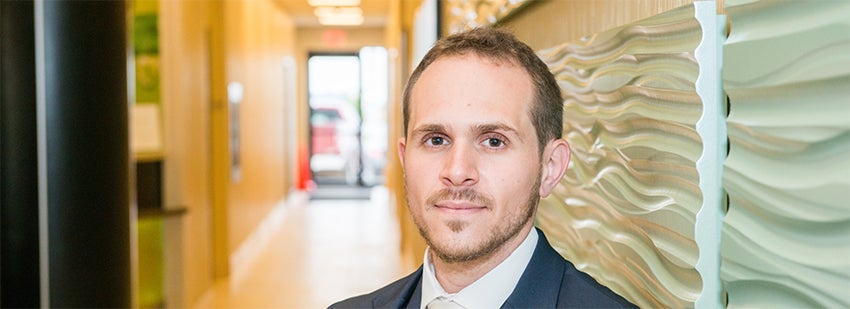
Francesco Sijinardo (Masters of Health Evaluation, '17) is the Lead for Performance Improvement for a mental health, addictions, and seniors’ health service provider in Toronto. In this role, he is responsible for monitoring and improving the clinical and operational performance of the organization, and overseeing all evaluation related activities including reporting to funders and partners, quality improvement, implementing and monitoring service and care standards, and leading digital health initiatives. His latest project is an outcome-focused evaluation related to transitional aged youth who utilize their mental health services.
Francesco’s passion for evaluation is fueled by a desire to understand the operations and nuances of health systems, and the opportunity to collaborate with stakeholders to enhance health service delivery and outcomes. As a result of his experiences, he sees a growing need for more professionally trained evaluators to assess the impacts of new and existing initiatives on outcomes within our health care system.
Through his experience, Francesco has realized some key insights for success in evaluation. He emphasizes the importance of assessing the effects of decision-making on front-line staff and other stakeholders. By understanding the ins and outs of service delivery and engaging key stakeholders, Francesco believes that an evaluator can enhance their effectiveness and outcomes.
Francesco's experiences in the Master’s of Health Evaluation (MHE) program have truly shaped his professional pathway. The MHE curriculum combined with his experiential practicum and collaborative projects solidified his passion for the field, and gave him the foundational skills and experience necessary to pursue a career in evaluation.
When Francesco is not working, he can be found spending time with his wife and son, riding his motorcycle, improving his machine learning skills, or reading case studies and articles about business, technology, health, or wellness. When asked if he would do it all over again, Francesco says that he wouldn’t change a thing!
We had the opportunity to ask Francesco a few specific questions about his experience and insights in the field:
How did your experience at the School of Public Health and Health Systems help you find your first position after graduation?
- Francesco: My experience with the practicum component of the degree was a strong indicator that evaluation as a career path was right for me. Prior to my enrollment in the MHE program, I performed evaluation related work in different capacities. Having the opportunity to conduct an evaluation from beginning to end demonstrated how important this work is. I am fortunate that my placement organization ended up reassigning me to an evaluation specific role at the end of my practicum.
What would you look for if you were in the position to hire new graduates from the School of Public Health and Health Systems?
- Francesco: This is a great question. Given that SPHHS graduates accumulate a strong set of knowledge and skills as part of their program, above all else, I’d look for someone with the right attitude. In my experience, the right people in the right role make all the difference in a work environment and often dictate the level of success a program, department, or organization achieves. Willingness to learn, patience, and the ability to take feedback are vital traits for new graduates entering the workforce for the first time.
What advice would you give students interested in your field?
- Francesco: When you graduate, try your best to find a position in an environment that promotes your learning and development and accepts the fact that mistakes will be made. These include work places that offer strong supervision and mentoring, or that maximize your exposure to different disciplines by providing opportunities to work on multiple projects. This is especially true for new graduates entering the work force for the first time. In health care, competent evaluators have the ability to greatly influence organizational decisions related to investment and service delivery, which ultimately affect people’s lives. Taking the time to build the right skills, the right way, at the beginning of your career, will pay dividends when it comes time to consult on a large-scale evaluation project, or help senior leaders and executives overhaul an entire department. I am more than happy to connect with any students interested in evaluation as a career, or who have questions about evaluation in health care. I can be reached at fsijinar@uwaterloo.ca.
What do you consider is the most essential skills for this career?
- Francesco: Those interested in pursuing a career in evaluation should take the time to develop a strong suite of “hard” and “soft” skills. The reality is that many evaluation projects require a degree of familiarity with applied research principles and methods. This includes being comfortable dissecting information and presenting it in a way that is meaningful for the target audience. Soft skills are important when engaging stakeholders, fostering buy-in, and understanding the impacts of an evaluation. Communication, empathy, and the ability to respect the details while understanding the big picture, are key.